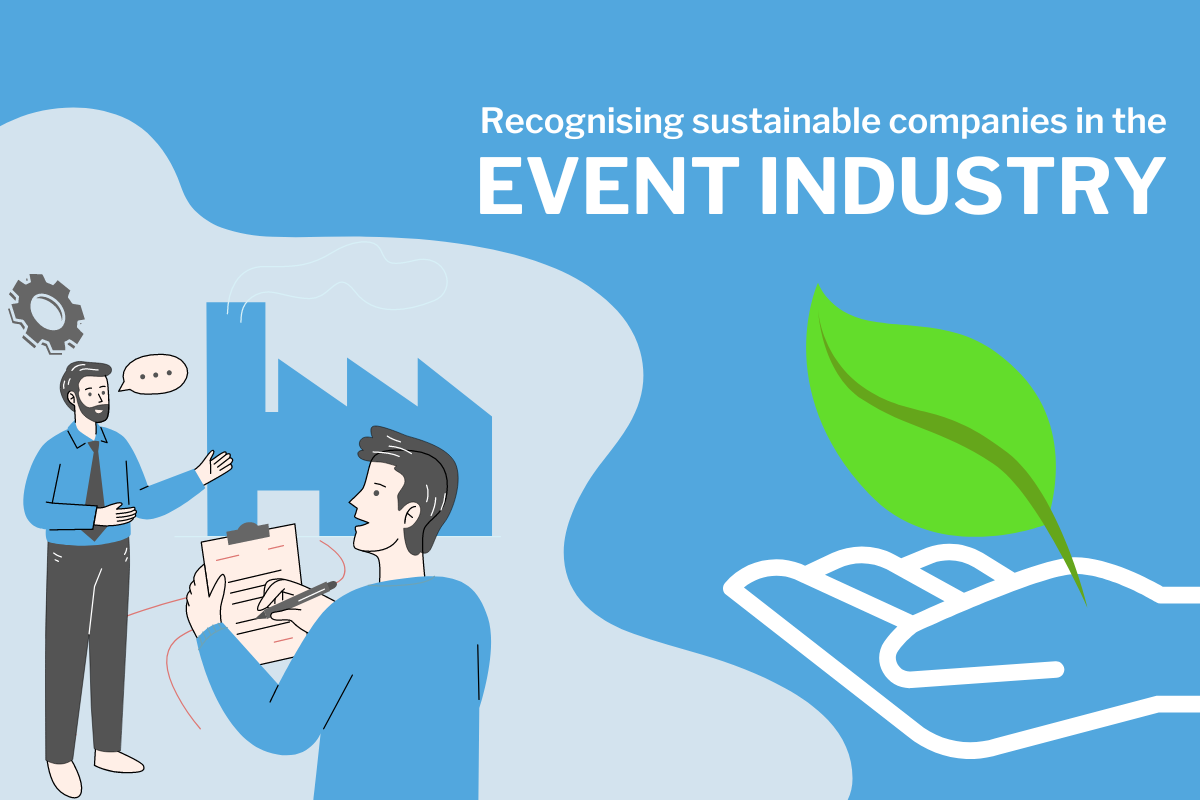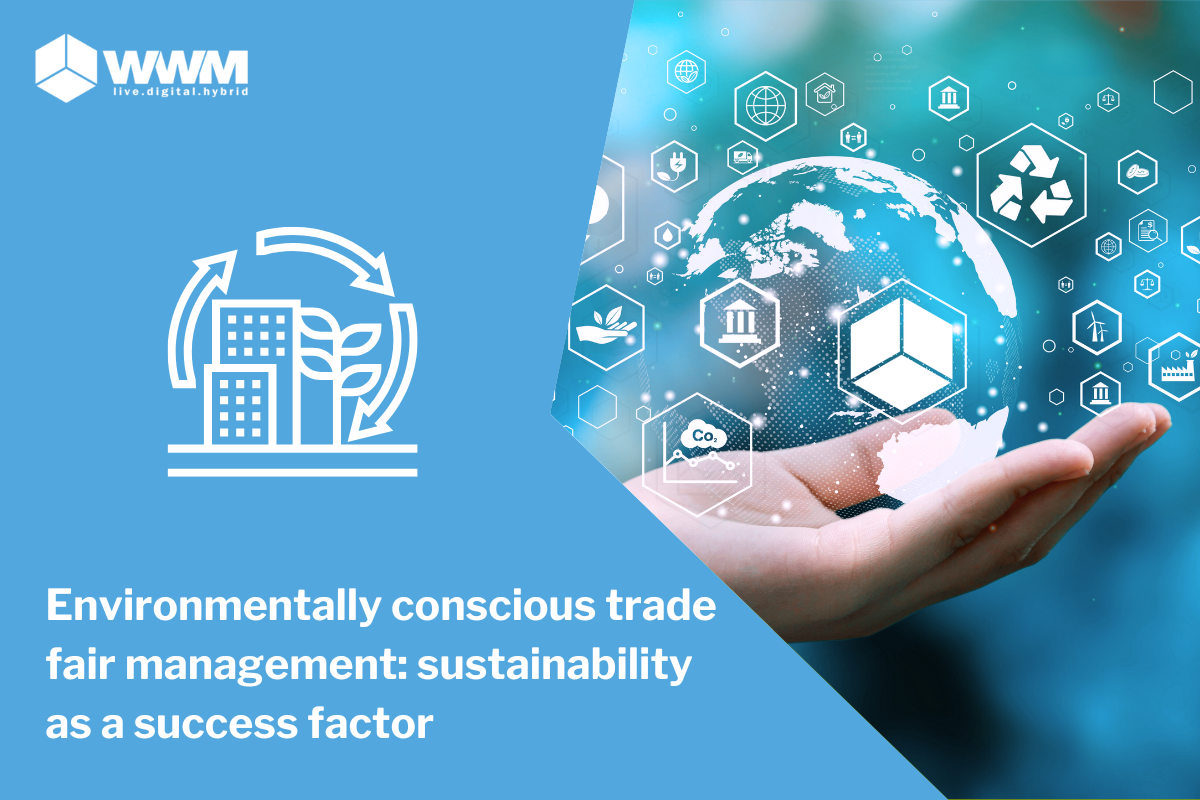Environmentally conscious trade fair management
In a world where sustainability is becoming increasingly important, companies are faced with the challenge of integrating these principles into all...
4 min read
 Archana Rajaratnam
:
Wednesday, 19. July 2023
Archana Rajaratnam
:
Wednesday, 19. July 2023

In a world characterised by constant change and progress, the topic of sustainability is becoming increasingly important and is therefore now a top priority for many companies. As a society, but above all as a company, we are faced with the challenge of rethinking our use of resources and finding sustainable solutions to protect the environment and leave a world worth living in for future generations. As a business owner, you are constantly under pressure from the outside world to act sustainably, both internally with your employees and externally with your business partners and customers. But what exactly does the term sustainability mean for entrepreneurs?
Companies interact with their environment in such a way that economic, ecological and social aspects are given equal consideration. In this sense, the management can ensure an environmentally conscious way of life and, above all, an environmentally friendly working environment by promoting and implementing sustainable and forward-looking aspects.
As part of sustainable organisation, it is important to reduce the consumption of materials and energy sources, work towards an environmentally friendly procurement process and thus take ecological criteria into account and promote sustainable options when selecting suppliers and products. This also includes the provision of environmentally friendly means of transport such as electric cars or bicycles for employees, as well as the assumption of social responsibility, consideration for the well-being of employees and sustainable working conditions. However, innovation is also an important prerequisite for sustainability, as the company endeavours to invest in research and sustainable development in order to make a positive contribution to environmental protection. Apart from the sustainability aspects, other factors also contribute to an environmentally conscious working style.
Environmental responsibility, social justice and the economic success of a company are top priorities today and are also important values for society. And the aim is to achieve long-term action that is in harmony with the needs of the environment and society.
We now know to what extent companies are addressing the issue of sustainability, but what about potential customers or interested parties? How do customers or potential customers recognise that a company is acting sustainably?
For many customers and prospective customers, environmentally conscious behaviour has become a decisive factor in their purchasing decisions. They favour companies for which sustainability is a matter of course and attach importance to transparency and trustworthiness. Among other things, they pay attention to
These operational measures ensure a responsible and trustworthy corporate culture and good cooperation.

At a time when the effects of climate change are becoming ever more apparent, it is vital that companies recognise their responsibilities and take action to operate in a sustainable and environmentally friendly way. However, this need extends not only to our everyday lives, but also to the way we plan and organise events.
The event management sector is known for its creativity and ability to create unforgettable experiences. Events of all kinds attract large numbers of people and serve as a platform for cultural exchange, networking and entertainment. However, they also often have a major impact on the environment. From the energy required for lighting or cooling and the use of disposable packaging to waste disposal or the transport of materials, events can have a significant impact on the environment. So how can the massive impact on the environment be prevented?
In order to minimise the potential negative impact of an event, events must be planned and held in a sustainable manner. Accordingly, the organisers contribute to making the ecological, social and economic impact of an event environmentally friendly and to preventing risks. It is about making conscious decisions for long-term and positive change.
Event organisers can introduce sustainable development measures, including the use of environmentally friendly materials at their events, digital solutions to minimise paper consumption or reducing energy consumption with the aim of reducing their environmental footprint. By incorporating social responsibility, events in turn support communities, promote economic development and ensure equal opportunities.
Sustainability has also become an important factor for the image of companies and event organisers. With their commitment to sustainability, events can build a positive image as an environmentally conscious organisation.
Companies in the trade fair industry are also increasingly recognising the need to take sustainable measures in order to make their events more environmentally friendly and socially responsible at the same time.
The trade fair industry is known for its impressive events at which companies can present their products and services. However, such large-scale events also cause considerable consumption of resources and energy. To avoid these risks, the exhibition industry today has many options to make its operations and exhibition stands more sustainable.
This includes the use of reusable materials such as reusable exhibition systems that can be used individually for exhibition stands. Raw materials can also be utilised through ecological printing processes or multiple use of exhibition stands. Virtual events also have advantages. This is because the use of virtual events or hybrid events can reduce travelling to the trade fair location. Digital solutions, such as the provision of digital information, create a sustainable alternative and reduce paper consumption. Another major advantage is the use of rental furniture, which can be hired for the duration of the trade fair and thus also reduces the cost of new furniture, as well as disposal after single use. In general, many other measures contribute to the success of a sustainable trade fair appearance.
This is because the implementation of sustainability measures in the trade fair industry is a continuous process that must be supported by everyone involved. This is why the integration of sustainability is intended to make trade fairs more environmentally friendly and future-proof events. The event industry is also supported by certification of its business practices. Which certification makes this possible?

As a consumer, you look out for sustainable and environmentally friendly products and services. But is this really sustainability or is it greenwashing?
In fact, some companies focus less on environmentally friendly products and services and more on improving their image. An example would be a company that advertises that its wood comes from sustainable resources, but in reality the wood comes from illegal logging. For this reason, you should check to what extent the company is certified by an independent body that checks and confirms sustainable measures and ecological criteria. And this is exactly where the ISO 20121 certification of the event industry provides a solution.
The international standard ISO 20121 is a certification for sustainable event management. The standard was developed to support companies in the event industry in integrating sustainability into their business processes. It ensures that events, such as trade fairs or congresses, are planned and organised in an environmentally friendly, responsible and economically efficient manner.
A company aiming for ISO 20121 certification proves that it is intensively engaged with the topic of sustainability and acts responsibly. For example, they must identify the impact on the environment, take stakeholders into account, control waste and emissions and improve sustainability performance in the long term. This will strengthen the trust of customers, stakeholders and the public. They also benefit from ISO 20121 by improving their sustainable behaviour and strengthening their image.
To summarise, it can be said that the relevance of sustainable development in the event industry is becoming increasingly important. It is important that both organisers and customers take an active role in promoting sustainable events, and with conscious action, commitment and innovative solutions, the event industry can make an important contribution to environmental protection and social development.

In a world where sustainability is becoming increasingly important, companies are faced with the challenge of integrating these principles into all...

Sustainable solutions are becoming increasingly important in modern trade fair construction. Companies, exhibitors and organizers are increasingly...

Flexibility for every occasion The trade fair industry has changed dramatically in recent years, and not without reason. Companies are faced with the...